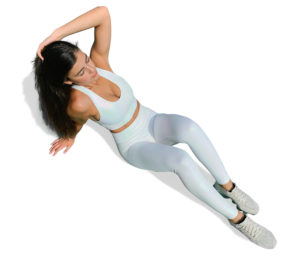More than just aesthetics
At its core, working out requires a lot of mental strength. The first step is in our head, then all the steps that follow deliver the payoff which brings the mind to a better place. To help us ensure that our motivation and dedication prevail and our initial goal is actually achieved, there are personal trainers who swerve as amplifiers of our energy. They encourage us not to give up, help us avoid any kind of monotony and guide us in the best possible way, so that we can achieve the goals we have set for ourselves

With winter approaching there is a tendency to ignore our bodies since they are mostly hidden under layers of clothes, but our health does not choose seasons. For our well-being, we need to bear in mind the importance of physical activity and recognize, with the help of those who really understand the subject, that it is very beneficial to adopt healthy lifestyles, with exercise and nutrition going hand in hand.
Personal trainer, certified nutritionist and nursing student, Maya Ganhão gave us an interview for this week’s edition, where she explains, in a very clear way, the advantages of physical exercise and how it can help improve our lives all year round.
Milénio Stadium: Why do people look for a personal trainer? Is it more for the need for technical advice or just to have someone to “force” them to do the exercise they often do not feel like doing?
Maya Ganhão: I think it’s a little bit of both. Exercise can seem overwhelming and complicated due to mixed opinions over social media, but it doesn’t need to be this way. Trial and error plus doing your own research can be a great way to learn and teach yourself, but this can often take a lot of time which postpones maximal results and can potentially lead to injury. Personal trainers can help bypass the time used to self-teach by providing guidance and convenience. They’re someone you can rely on for knowledge, teach you correct form and create effective workouts for maximal results while preventing injury. I also want to mention that personal trainers aren’t only for beginners. The technical advice they provide can be useful for anyone. Even someone like myself, who is qualified, can still learn a ton from someone else. I think it’s very beneficial for anyone, at any stage in their fitness journey, to seek assistance from a personal trainer even if it’s just for a form tune-up. I’ve also noticed that many people struggle with motivation. I always say that we need to strive for dedication opposed to motivation. Once fitness becomes a habit, it will be much easier to adhere to. However, many find that they gain a sense of accountability from a personal trainer and it’s true! It’s not necessarily a sense of feeling “forced” but a sense of feeling responsible and challenged to workout, lift that extra bit of weight, or do that last rep. Working out is just as much, if not more, of a mental battle than a physical one. Having someone help you push through the mental struggle and tell you “you can”, in a moment you feel you can’t, is empowering!
MS: In the months leading up to summer, it’s normal for people to seek out help in order to lose some weight. Do you notice the same concern regarding “getting in shape” for the winter?
MG: The big thing I’ve personally noticed regarding “getting in shape” for winter is related to the holidays. Between Thanksgiving, Halloween and Christmas, we naturally tend to overindulge and feel a need to “get back on track” or go on a diet to compensate for the extra treats. Plus, with the start of a New Year in January, it feels like a nice fresh start to try and adopt new habits. I’m personally all for people making a change to better their health and overall wellbeing however, I always say, there needs to be a deeper meaning connected to your movement. Your reason for fitness should be more than just losing weight for an event or “getting in shape”. You should be deeply connected to this reason, and it should be long-term because there are no quick fixes to “get back on track”. That initial desire of “getting in shape” can help kick-start your fitness journey but developing a deeper meaning will help turn exercise into a lifestyle, not just a phase.
MS: How can physical exercise help us to be better prepared for the winter?
MG: I personally think exercise is beneficial regardless of the time of year but choosing a style and regime that works for you and that you enjoy is key. Whether you like circuits, CrossFit, weightlifting, Zumba, you name it! Finding something you genuinely enjoy makes movement exciting and tailored to you. So, it’s not necessarily about choosing a form of exercise that will prepare you for winter, but a form of exercise that will help you develop a sustainable training regime. Then, with whatever training style you choose, you will reap health benefits such as strengthening muscles, joints, improving your cardiovascular health, etc. I know I sound redundant but finding what works for you is crucial. Fitness isn’t a cookie cutter, one size fits all policy that is dependent on the season. It’s dependant on the individual and that’s what needs to be focused on.
MS: Although winter is beautiful to some, to others the shorter days and stress of the holidays can trigger anxiety and depression —what’s often referred to as the “winter blues”. We know that physical exercise can have a profoundly positive impact on our mental health. Is this something that people seeking your services are concerned about?
MG: I definitely think many people feel the pressures of the holiday season. Between wanting to “look good” for the holidays and feeling guilty about indulging a bit more than usual, people seek fitness as an outlet and a resolution to their problems. However, like I said before, we need to develop a deeper connection to our movement for it to become a habit. Nonetheless, the mental benefits associated with exercise are incredible and scientifically proven. Whether you view it as “look good, feel good” or you recognize the objective facts related to endorphin release, fitness does in fact improve our mental health.
I think a lot of people want to feel a sense of self-love and although it might seem that the self-love is rooted in “looking good”, once you develop dedication for exercise, you will see that it’s more than just aesthetics. There’s almost a sense of addiction in the feeling of accomplishment and pride that keeps people going and really alters their mental health for the better. The mental progressions I’ve seen in others and have seen in myself after developing positive habits related to exercise are enough to prove the value and importance of activity.
MS: What are a few simple exercises that can be done on a regular basis to help us physically and mentally prepare for the winter?
MG: I would recommend starting with compound movements such as squats, deadlifts, chest press, military press, etc. These are multi-joint exercises that target more than one muscle group at a time and will help build the foundation to whatever training style you choose. These movements also help with functionality (helping you perform everyday tasks), prevent muscle imbalances by working your whole body, and are perfect no matter what level of fitness you’re at. Like I said, these movements are the foundation to your training so variations of each will be seen consistently throughout your fitness journey and should be worked on weekly for progression.
MS: What would be a suitable diet for people who are excreting regularly?
MG: I think the best diet is one that is balanced, makes you feel good and you enjoy. I believe food should be enjoyed and if you aren’t consuming foods you enjoy, your diet won’t be sustainable. I also think balance is key. If you’re forcing yourself to eat all “healthy” foods that you don’t enjoy, you will probably dread eating and it will be very hard to adhere to. I personally like to follow the 80/20 Rule which is consuming 80% whole, nutritious foods and 20% of treats or foods you enjoy. This is a great ratio to promote balance and sustainability while keeping you interested in your diet which can prevent binging or restrictive dieting. Lastly, food is meant to help us function and feel good! If you’re choosing food that doesn’t sit well with you or doesn’t give you enough energy, it isn’t doing its full job. Everyone has different needs, preferences and goals. Finding a diet that accomplishes all these things is ideal.
Catarina Balça/MS







Redes Sociais - Comentários